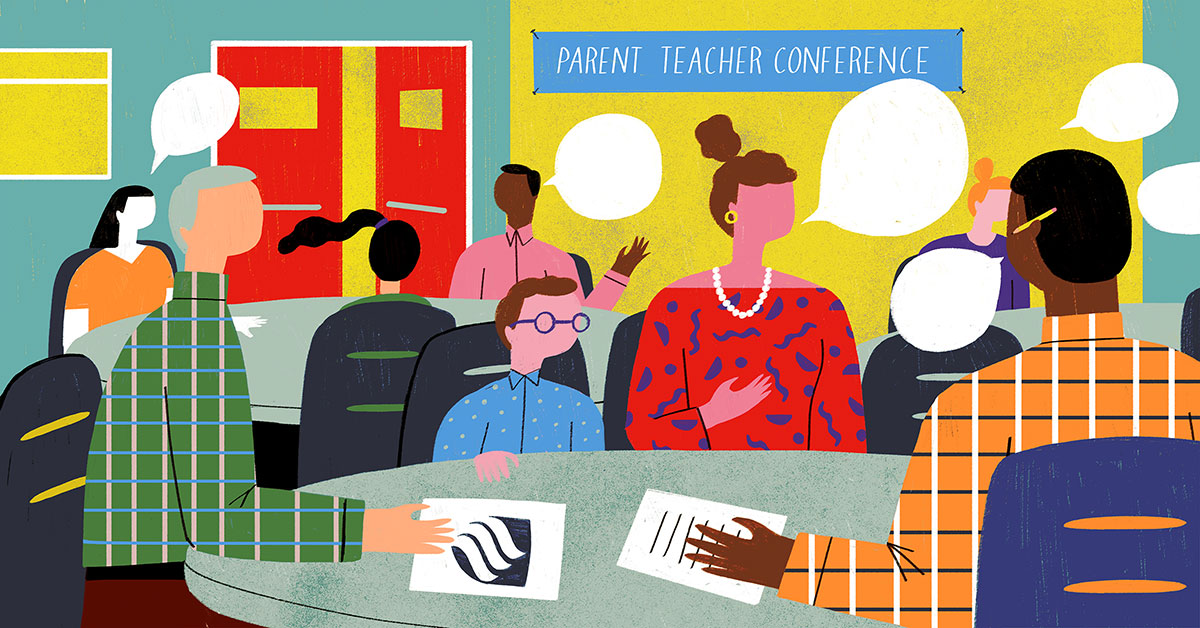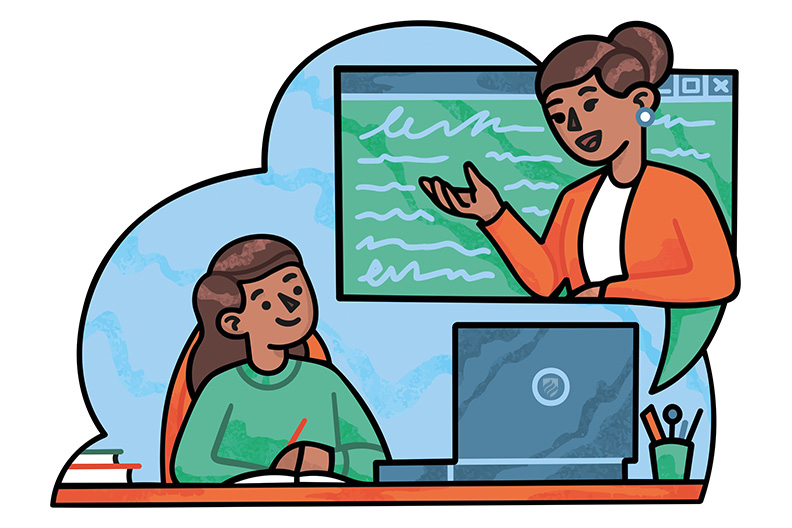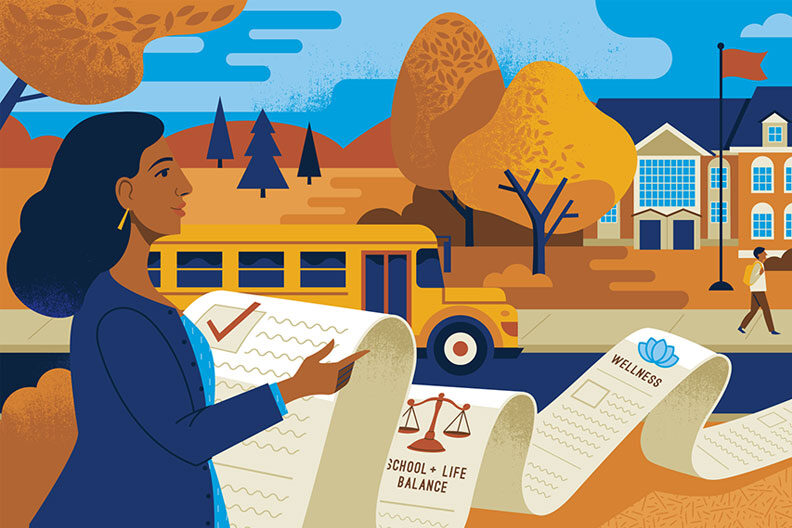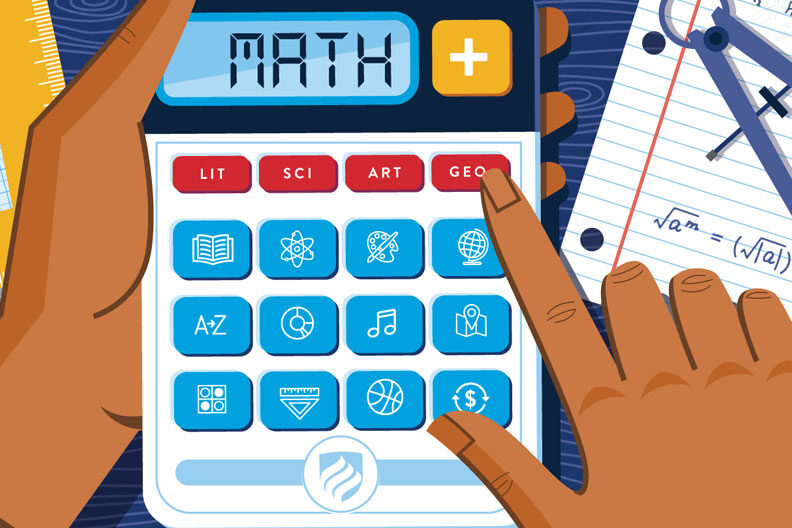Parents
- May I have a copy of the report card to review before we meet?
- How long will we have for the conference?
- If I have concerns that are not academic but school-related, will we have time to discuss them at this conference?
Teachers
- What subject area do you want to focus on first in the conference to make sure we address it?
- Do you have questions or concerns that you want me to be prepared to discuss?
- Will you need more than __ minutes for your conference?
Before: Should My Child Attend?
Opinions differ over whether the student should attend the parent-teacher conference.
The way a teacher organizes the conferences might dictate the answer. For example, in grades five through eight, some teachers organize student-led conferences in which the students help prepare for the meeting and share their progress with parents. This type of sharing can be an excellent learning opportunity because students work with their teachers to self-evaluate their work and practice how they will orally present it to their parents.
Parents, meanwhile, might make their own decision whether to have the student attend with them. If the student attends, the questions and discussion should be well-planned and the student should be part of the conversation.
During: Five Core Questions to Prepare
While the most effective questions to ask will depend on the individual student, the teacher, and the parent, there are overarching questions that both parents and teachers should be asking each other.
Here are five that are important in any conference.
1. What Do I Need to Know?
Keep the conference focused on the most important information that needs to be shared in the limited meeting time. If the information can be easily communicated in writing, then what needs to be discussed that isn’t evident?
For example, I was once in a 10-minute conference with a high school teacher who explained that she believed the “B” my son was earning in Spanish would have been an “A” if my son had chosen to do the optional homework. That was information that helped me understand the grade and discuss with my son why he did not choose to do the optional homework.
2. How Can I Help?
This is probably the most important question any parent or teacher can ask of the other. If the conference is truly collaborative, then there is always a way that teachers and parents can help support the student. However, answering this question is not always easy. Sometimes it takes a great deal of thought to consider how someone else might help you.
Don’t expect an immediate answer—but always ask the question and make sure there is follow-up. The answer should never be, “There’s nothing you can do.”
3. What Successes Can we Build Upon?
Too often, conferences focus on areas for improvement and the successes are assumed to not be question-worthy.
Discussing successes and using those successes as potential sources of information for making improvements in other areas is essential to a parent-teacher conference that is truly focused on helping the student grow, learn and enjoy school.
4. Who Else Needs to Be Involved to Ensure the Student’s Success?
Many parent-teacher conferences are two-person meetings, which means that some of the key players in a student’s success aren’t present. It is important to answer the question “How can I help?”—but “Who else needs to help?” should also be discussed.
“It takes a village” is an overused but apt phrase to apply in parent-teacher conferences. A student’s success cannot be determined by the singular efforts of just one parent or one teacher working alone. Considering the influence of others in each student’s success is essential, whether it’s a coach, a friend, another teacher, etc.
5. When Will We Communicate Next?
Finally, it is always important to close out a conference with a commitment not just to “stay in touch.” You must also come up with a definitive way in which communication will remain ongoing. Asking about how to follow up or the best ways to stay in contact (e.g., email, phone call, note home, etc.) should be discussed before time runs out on any parent-teacher conference.
After: Do We Need a Different Type of Conference?
Knowing the purpose of the conference and its process are prerequisites for successful parent-teacher meetings. This essential information requires being clear about the goals for meeting and helps parents and teachers prepare relevant questions in advance. Understanding why you’re meeting will help you decide if a different type of conference is needed. For example:
- If parents or teachers are going to share sensitive information that needs to be discussed without the student present, then a conference should be planned, but outside of the mass-scheduled conferences with tight time windows and lots of people leaving and entering the classroom.
- If there is a specific problem or an incident has occurred that involves other faculty, staff, or students, then these problem-based conferences should be scheduled at a time and place where that specific problem can be addressed, rather than inserted into a discussion of the report card.
- If the conference determines that another faculty or staff member should attend, or the student should be present, then the planning process begins again. To reach a successful outcome, state a clear, focused goal so that every participant is prepared with questions directly related to the purpose of that specific meeting.
Before, During and After: How Do We Keep the Focus on the Student?
Finally, if nothing else, make sure that any parent-teacher conference keeps the focus on the student:
- What can we do to make learning more successful?
- How can we work together to make school an enjoyable experience?
- What do we need to share with each other that will build our cooperation and improve home-school communication?
Recommended Quick Reads from Edutopia
Learn More About Elmhurst University
Develop your teaching skills at Elmhurst University, which offers an M.Ed. in Teacher Leadership. Use the form below to let us know you are interested!
About the Author
 Deb Meyer is a professor of education at Elmhurst University and a former classroom teacher in Mesa, Arizona. She teaches undergraduate courses to prospective teachers in educational psychology and upper elementary/middle school literacy methods and graduate courses in teacher leadership.
Deb Meyer is a professor of education at Elmhurst University and a former classroom teacher in Mesa, Arizona. She teaches undergraduate courses to prospective teachers in educational psychology and upper elementary/middle school literacy methods and graduate courses in teacher leadership.
Illustration by Josie Portillo
Posted Dec. 3, 2019











